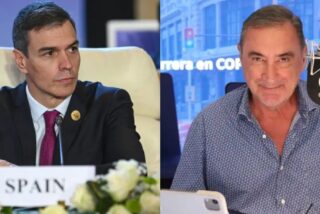
(PD).- La fiesta ha terminado. Así se titula el informe especial que la prestigiosa publicación económica británica The Economist ha dedicado a España.
«Tan rápido fue el deterioro que Zapatero, que había rechazado en inicio que había una crisis económica, pero interrumpió en agosto sus vacaciones para reunir un gabinete de crisis», comenta en su reportaje inicial, que titula La mañana siguiente.
Según explicaCristina Delgado en El País, Michael Reid, responsable del informe que verá la luz el próximo 11 de noviembre, lo ha dejado claro:
«después de años de diversión, ahora alguien tiene que pagar la cuenta. Y seguramente no se podrá mantener el nivel de vida de los últimos tiempos».
Para componer este informe, Reid ha pasado una temporada en España y ha entrevistado a grandes personalidades del panorama político, económico y social como el presidente del Gobierno, José Luis Rodríguez Zapatero, varios ministros, dirigentes políticos, empresarios, académicos y otros pensadores.
Los ejes centrales que vertebran el cuadernillo de 20 páginas resultantes de la estancia son sencillos: la fiesta de la prosperidad en la que España estaba inmersa ha terminado y el país corre el riesgo de enfrentarse a una recesión profunda. Reid calcula que durará cerca de dos años.
Para salir de la crisis, la devaluación de la moneda, que en otros momentos dio resultados, ahora con el euro no es una posibilidad, así que hay que buscar otras alternativas, que pasan por llevar a cabo reformas estructurales.
Flexibilidad del mercado laboral, una mayor cohesión nacional y destierro de los localismos, el español como estandarte de los negocios y la mejora de la competitividad son algunas de las recetas que ofrece The Economist para salir del hoyo.
Entre los puntos fuertes de España con respecto a recesiones anteriores, destaca que las finanzas estatales están más preparadas, existen empresas con fuerte internacionalización y especialización y hay un sector bancario potente y sano. Parafraseando al ex director gerente del Fondo Monetario Internacional (FMI), Rodrigo Rato, para The Economist, «no se trata de hacer un nuevo modelo económico, sino de que el viejo modelo sea mejor».
La España de las tres últimas décadas
La publicación repasa la situación de España a través de un recorrido por su evolución, centrado especialmente en los últimos 30 años. Para The Economist, «mucha gente mayor es bajita», por la dura vida de la posguerra. Sin embargo, «los jóvenes españoles son notablemente más altos que sus abuelos».
Como ejemplo, pone a Pau Gasol, el jugador de la NBA que mide 2,13 metros. Los nacionalistas están «obsesionados» con sus lenguas y el localismo de muchas regiones ha hecho que se vuelva al caciquismo.
Los administrativos de los tribunales superiores «sólo trabajan por las mañanas, pero cobran por todo el día completo» y los españoles, que en plano individual son encantadores, se vuelven «defensivos y poco serviciales» si tienen que atender a clientes. Zapatero es un gran estratega que ha basado su táctica en el flirteo con los nacionalistas y la provocación a la oposición.
Los nacionalismos y la descentralización española son los platos fuertes del informe, a los que dedica el artículo más extenso. ¿Cuánto es suficiente? La transferencia de competencias a los gobiernos regionales ha sido buena para España, pero podría haber ido demasiado lejos, se titula.
Para Reid una posible solución al problema de la lucha de competencias e identidades en España sería el federalismo. La recesión, advierte, será una prueba definitiva para el sistema político, y si no se toman las medidas adecuadas, se alargará e impulsará más el paro.
El especial ha sido presentado en el Círculo de Bellas Artes de Madrid por el propio Michael Reid, quien además participó en una mesa redonda centrada en los ejes del informe en la que han participaron Javier Moreno, director del diario El País; Borja Bergareche, redactor jefe de internacional de ABC; José Antonio Alonso, director de ICEI; José Varela Ortega, Presidente de la Fundación José Ortega & Gasset y editor de El Imparcial; Luís de Sebastián, catedrático de economía de ESADE y Matías Rodríguez Inciarte, Vicepresidente de Banco Santander.

SPAIN
The morning after
Michael Reid
After three decades of partying, Spain has woken up with a hangover. Curing it will require changes
THE past few months have been bittersweet for Spain. In a general election in March the Socialist Party won a clear but not overwhelming victory, giving José Luis Rodríguez Zapatero a second term as prime minister.
That seemed to drain some of the partisan poison that had accumulated in the political system over the previous four years.
In June Spain shook off its long-standing reputation as the permanent under-achiever of world football, winning the European championship with swift and skilful attacking play.
Not only did the performance of its young team (featuring Catalans as well as the usual Madrileños in prominent positions) seem to echo Spain’s flowering of creativity in everything from architecture to gastronomy; many commentators saw the footballers’ triumph and the public’s rapturous response to it as a welcome expression of national unity in a country that seemed to be turning increasingly fissiparous.
In July Rafael Nadal, a tennis genius from Mallorca, won the Wimbledon championship. At the moment of victory he scampered across the press-box roof, clutching the national flag, to salute Spain’s crown prince and his wife.
But every month since the election the news at home has become gloomier.
Investment is slumping. Unemployment in August was 11.3%, a third higher than a year earlier, the biggest jump for 30 years. The economy grew by just 0.1% between the first and the second quarters of this year, the slowest pace since 1993.
It is now almost certainly contracting. So sharp was the deterioration that Mr Zapatero (pictured above with Pedro Solbes, his finance minister), who had earlier refused to acknowledge that there was any economic crisis, interrupted his August break to hold an emergency cabinet meeting.
“Spaniards went on holiday in party mood and came back to find there was no champagne left, nor even any decent wine,” sums up Fernando Fernández, a former IMF official who is now rector of Nebrija University near Madrid.
Great while it lasted
The fiesta had indeed been splendid. Spain has undergone an extraordinary transformation since Francisco Franco died in 1975 and his long dictatorship came to an end. Democracy was swiftly consolidated. A deeply conservative Catholic society has metamorphosed into an almost self-consciously tolerant one.
In the 1960s two-fifths of Spaniards still toiled on the land, many of them living in poverty. Now only 5% work in agriculture. Spain has become a vibrant, middle-class urban society.
Social and political change went hand in hand with economic progress. Between 1994 and 2007 the economy grew at an average annual rate of 3.6%. During that period unemployment fell from 24% to 8%, even though many women joined the labour force and some 5m immigrants arrived—and were absorbed with scarcely any sign of tension. For most of the past decade Spain has been responsible for creating about one in every three new jobs in the euro zone.
By 2007 total employment had risen to 20m, from only 12m in 1993. When Spain joined the forerunner of the European Union in 1986 its income per person was only 68% of the club’s average; in 2007 its income per person was 90% of that of the 15 EU members before its latest expansion. Living standards are now higher than Italy’s.
The improvement in Spaniards’ lives is instantly visible. Many elderly people are short, stunted by the hunger they suffered as children in the hard years of fascist autarky after Franco won the civil war of 1936-39. Young Spaniards are strikingly taller than their grandparents, exemplified by Pau Gasol, who measures seven feet (2.13 metres) and was voted the most valuable player when Spain won the latest world basketball championship.
Spain is not just a desirable place to live—though it is that, attracting northern Europeans who have bought second homes in order to enjoy the Spanish combination of sun, good public services and a relaxed way of life.
In 2006 it was the world’s ninth-largest economy measured at market exchange rates and the twelfth-largest at purchasing-power parity. It is the sixth-biggest net investor abroad.
The economic boom began under Franco, who abandoned autarky in the late 1950s. He turned the management of the economy over to technocrats from Opus Dei, a lay Catholic organisation, who opened it to foreign trade and investment.
But a bigger change came in 1986 when Felipe González, a Socialist prime minister, led Spain into Europe. Foreign direct investment flooded in as multinationals set up car and other factories to take advantage of relatively low wages.
The euro effect
Money from Brussels also poured in. Spain has been the largest single beneficiary of EU regional funds. It has received a total of €186 billion, most of which was wisely spent on improving roads and railways.
Under Mr González’s successor, José María Aznar of the conservative People’s Party (PP), Spain qualified to join the euro at its inception in 1999. Interest rates fell dramatically: the cost of mortgages, for example, came down from 18% to below 5%, unleashing a housing boom.
Yet with a suddenness that has taken officials by surprise, economic boom has turned to bust. When the European Central Bank raised interest rates last year, the housing bubble burst.
Higher oil prices also cut disposable income, as well as pushing inflation to a new high of 5.3% in July. And international financial turmoil has caused a credit squeeze at home.
Mr Zapatero points out that so far Spain has fared no worse than several other large European economies, and that the country’s financial system is stronger than that of many of its counterparts: to date, no Spanish bank has got into difficulties.
In an interview for this special report Mr Zapatero conceded that the economy faces a period of stagnation, but insisted that “once calm returns to the international system, we will return to growth without the Spanish economy having suffered structural damage.”
The government forecasts that after a year of almost no growth a recovery will start towards the end of 2009.
This strikes many as far too optimistic. Economists and businesspeople complain that the government was slow to respond to the economy’s swift descent into recession. One of the country’s most experienced bankers reckons that even if the outside world rights itself fairly quickly, recovery will not begin for at least two years.
Some are even more pessimistic, arguing that in addition to the liquidity squeeze and the housing bust Spain suffers from an underlying lack of competitiveness.
The symptoms are a current-account deficit that topped 10% of GDP in the first half of this year and an inflation rate that has been about one percentage point higher than the average for the euro zone for most of the past decade.
Fixing this will not be easy. When recession struck in the past, as it did in the early 1980s and again in 1993, the key to recovery was devaluation. But with Spain in the euro that option is no longer available.
Unless the government rams through structural reforms to make the economy more competitive, the argument goes, adjustment to a harsher economic environment will involve a big rise in unemployment and years of stagnation.
Instead of going into a V-shaped recession, with a swift recovery, the economy could be heading for an L-shaped depression.
Spain’s prosperity is due partly to good luck, in the form of EU entry. But for most of the past 30 years it has also managed its affairs far better than its southern Mediterranean peers have done.
Despite some corruption, particularly in local government, Spanish politics is generally fairly clean. The country’s economy is relatively open and flexible—halfway between Britain and the rest of continental Europe. Economic management has been mostly competent and stable: since 1993 Spain has had just two finance ministers (Italy has had four since 2001 alone).
Mr Solbes, who has held the job since 2004, had an earlier spell in 1993-96 under Mr González before moving on to become the EU’s commissioner for economic and monetary affairs. Under Mr Aznar the incumbent was Rodrigo Rato, who subsequently became the IMF’s boss.
Officials reel off other reasons why Spain is now a different and stronger country than it was when recession last struck. For example, in 1993 the government had a budget deficit of 7% of GDP; in 2007 it had a surplus of 2.2% and public debt was just 36.2% of GDP, down from a peak of 68% in 1996 (compared with Italy’s figure of 104% in 2007 or Britain’s of 44%).
Even more importantly, over the past 15 years a clutch of powerful Spanish multinationals has emerged. In 2000 the Financial Times list of the world’s 500 biggest firms by market capitalisation included only eight from Spain; by 2008 the figure had risen to 14.
A generation of young Spaniards that has grown up knowing nothing but rapid economic growth may now have to contend with unemployment. This will put Spain’s political system, as well as its economy, to its most severe test since the early years of its transition to democracy.
This special report will weigh the country’s strengths and weaknesses and assess its prospects for renewed economic growth. It will argue that Spain can avoid Italy’s fate of seemingly remorseless decline. But there are some grounds for concern in politics.
Spain
After the fiesta
A European success story; but it is time for José Luis Rodríguez Zapatero to step outside his comfort zone
GROUCHO MARX got it wrong when he said that he didn’t care to belong to any club that would have him as a member. There are in fact few things in life so wounding to self-esteem as to be excluded from a gathering where you think you rightly belong.
In an attempt to avoid such a fate, José Luis Rodríguez Zapatero, Spain’s prime minister, has cast dignity aside and importuned all and sundry with a request to be invited to a conference on November 15th to discuss reforms to the international financial system. The brainchild of France’s Nicolas Sarkozy and of America’s George Bush, the conference will be attended by the G8 economies and 12 large developing countries. Spain belongs to neither group.
Whether or not the conference proves to be important, Mr Zapatero is right that he deserves to be there. Spain is the world’s ninth-largest economy at market exchange rates, or twelfth when measured by purchasing power (making it bigger than Canada, a G8 member). It is the world’s seventh-biggest foreign investor.
It has two of the 20 biggest banks, and it has made a good job of regulating its banking system (see our special report). Like the United States, Britain and Ireland, Spain has seen a runaway housing boom turn to bust over the past year. Unlike them, none of its banks has yet had to be bailed out. Indeed, Banco Santander has been shovelling up banking roadkill in Britain and the United States.
So Spain has something to say in any discussion about global finance. Its non-invitation may owe something to Mr Bush’s puerile sulk at Mr Zapatero over his abrupt withdrawal of troops from Iraq in 2004. But if Spain is too easily overlooked, it is partly Mr Zapatero’s fault.
He is one of Europe’s few successful politicians of the left. Underestimated by his opponents at home, he was re-elected to a second term earlier this year. But he has shown little interest in the world beyond Spain. In this parochialism he faithfully represents a country where decentralisation has brought benefits but narrowed political horizons. That does not reduce its potential cost.
La cuenta, señores
In the three decades since it emerged from dictatorship Spain has become one of the world’s success stories. It has turned into a robust democracy and a tolerant society. Until recently it was creating one of every three new jobs in the euro area. But too many of those jobs involved building more than a third of all the new houses started each year in the euro zone. The housing bust at home, as much as the financial turmoil abroad, has sent Spain skidding towards recession. For an economy that has been growing at close to 4% a year for a decade, this is a painful experience. Already this year unemployment has shot up by 750,000 to 2.8m, or 12.3% of the workforce.
After initially downplaying it, Mr Zapatero has responded reasonably effectively to the slowdown. The government has announced measures to inject liquidity; the unemployed will be able to postpone part of their mortgage payments.
But the test will be whether the prime minister takes the steps needed to make the recession as short and mild as possible. These include structural reforms, especially of the labour market, to address Spain’s growing loss of competitiveness—it is no longer a cheap place to do business, and its workers are not especially productive. He may also have to claw back money and regulatory power from the regional governments.
That is not easy, since the electoral system gives exaggerated weight to Basque and Catalan nationalists. Like some of its predecessors, the government is dependent on their support to pass its budget. And as foreign investment heads elsewhere, Mr Zapatero needs to sell his country more aggressively abroad.
In contrasting ways both of his predecessors, Felipe González and José María Aznar, carved out a role for Spain as an important actor in Europe and as a bridge to the Americas. History may judge that Mr Zapatero was right to oppose the war in Iraq.
But under him and his foreign minister, Miguel Angel Moratinos, Spain’s foreign policy has resembled the pleadings of an NGO rather than the cool-headed pursuit of national interest by a country which wants to be treated as a world leader. In his first term, Mr Zapatero’s main initiative was a worthy but nebulous “Alliance of Civilisations”. In his second term he has set as a goal the worldwide abolition of the death penalty.
Mr Zapatero has proved himself a skilled political tactician. But he has shown no willingness to lead his Socialist Party out of its politically correct comfort zone. If Spain’s remarkable success is not now to be followed by stagnation and limited international relevance, he will have to do so.








































